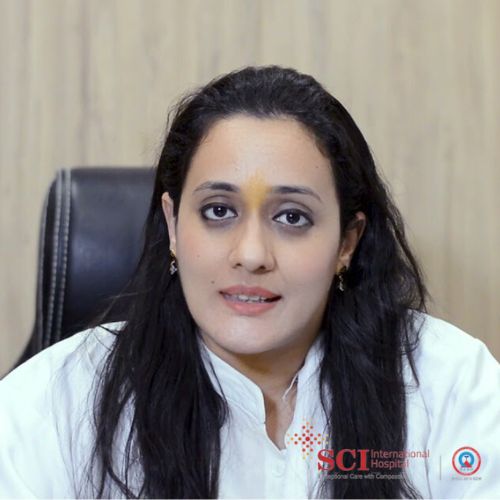As a gynecologist at SCI Hospital in Delhi, we understand that the thought of a hysterectomy, the surgical removal of the uterus, can feel overwhelming. My goal is to guide you through every step, answer your questions, and help you make the best decision for your health.
We Are Rated
Consult Now
A hysterectomy is an operation where the doctor removes your uterus (womb). Depending on your needs, the doctor may also remove your cervix, ovaries, or fallopian tubes. After this procedure, you will no longer have menstrual periods and will not be able to become pregnant.
Many women in Delhi and across India need a hysterectomy for various reasons. We recommend this surgery only when other treatments have not worked or are not suitable. Common indications include:
We always choose the safest and most effective type of hysterectomy for your unique situation. Here are the main types:
Type of Hysterectomy What’s Removed Common Reasons Total hysterectomy Uterus and cervix Most commonly, many indications Partial (supracervical) Upper part of uterus, cervix remains Select cases Radical hysterectomy Uterus, cervix, upper vagina, surrounding tissue Usually for cancer With/without ovaries/tubes Sometimes ovaries and fallopian tubes are also removed Depends on your condition
At SCI Hospital, we offer the latest surgical methods to ensure a safe and comfortable experience:
1. Abdominal Hysterectomy
Before Surgery
After surgery, most women stay in the hospital for about 1 to 3 days, depending on their recovery and the type of procedure performed. Some pain or discomfort is expected, but this is effectively managed with prescribed medication. Recovery time varies based on the surgical method—typically 2 to 4 weeks for vaginal or laparoscopic hysterectomy, and 4 to 6 weeks for an abdominal hysterectomy. Your doctor will provide personalized guidance on when you can safely resume daily activities, including work, physical exercise, and sexual activity.

MBBS, MD - Obstetrics & Gynaecology, DNB - Obstetrics & Gynecology, Infertility Specialist

MBBS, MS Obstetrics & Gynaecology, Gynecologist, Infertility Specialist
While hysterectomy is generally safe, every surgery has risks. The doctor take every precaution to minimize these, but possible complications include:
Most women recover without serious problems, especially with good pre-surgery health and aftercare.
At SCI Hospital, we understand that cost is a concern for many families in Delhi. The cost of a hysterectomy can vary based on:
We provide a personalized cost estimate after your consultation, ensuring transparency and no surprises. Our team will help you understand your options and guide you through insurance or payment plans if needed.
If you are considering a hysterectomy in Delhi or want a second opinion, please contact me at SCI Hospital. The doctor am here to answer your questions, explain all your options, and support you throughout your journey to better health.
After a total hysterectomy, where both the uterus and cervix are removed, sperm deposited in the vagina during intercourse has no pathway to enter the uterus. It is naturally expelled or absorbed by the body as before, but fertilization cannot occur.
Yes, a hysterectomy is considered major surgery. It involves removing an organ, requires anesthesia, and necessitates a recovery period. However, minimally invasive techniques like laparoscopic or vaginal hysterectomy often allow for faster recovery and less pain compared to traditional open surgery.
A vaginal hysterectomy is a procedure where the uterus is removed through an incision inside the vagina, leaving no external abdominal scars. This method typically results in less pain and quicker recovery than abdominal surgery.
In laparoscopic hysterectomy, small incisions are made in the abdomen through which a camera and specialized instruments are inserted. The uterus is detached and removed either through the vagina or one of the small incisions, depending on its size.
To avoid weight gain after hysterectomy, it is important to maintain a balanced diet rich in fruits, vegetables, and lean proteins, engage in regular physical activity such as walking or yoga, monitor calorie intake, and manage stress. Hormonal changes after surgery may affect metabolism, so a healthy lifestyle is essential.
Hysterectomy is generally safe when performed by an experienced surgical team. While risks such as bleeding, infection, or injury to nearby organs exist, serious complications are rare, especially with minimally invasive approaches.
A laparoscopic hysterectomy typically takes about 1 to 2 hours. The exact duration depends on individual anatomy and whether additional procedures are performed.
Yes, having a hysterectomy during menstruation is safe and does not affect the surgery or recovery.
Breast pain is not a common symptom after hysterectomy. However, if the ovaries are removed, causing sudden menopause, hormonal changes may occasionally lead to breast tenderness.
Hospital stay varies by surgical method: 1–2 days for vaginal or laparoscopic hysterectomy, and 2–5 days for abdominal hysterectomy. Early mobilization is encouraged to aid recovery.
Some vaginal discharge after hysterectomy is normal and can last for a few weeks as healing occurs. The discharge should decrease over time and should not have a foul smell or be accompanied by heavy bleeding. Any unusual symptoms should be reported promptly.
A partial (supracervical) hysterectomy involves the removal of the upper part of the uterus while leaving the cervix intact. This procedure is selected based on specific medical indications.
Light activities such as walking can begin within a few days post-surgery. More strenuous exercise and heavy lifting should generally be avoided for 4–6 weeks, depending on recovery progress and doctor’s advice.
The procedure usually lasts between 1 and 3 hours, depending on the type of surgery and individual patient factors.
If the ovaries are removed during hysterectomy, menopause begins immediately. Menopause symptoms can last several years, but duration and severity vary. If ovaries are preserved, natural menopause will occur later at the usual age.
Consult Now
